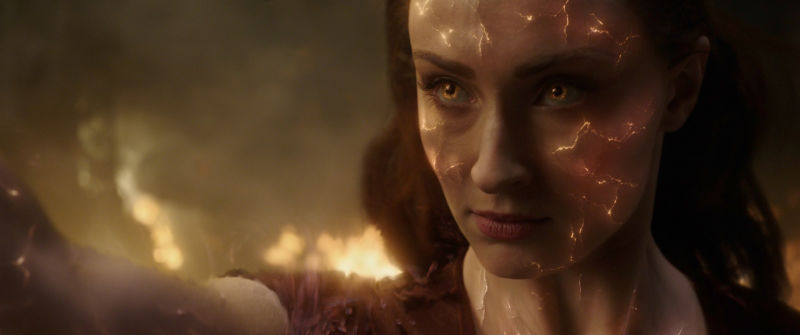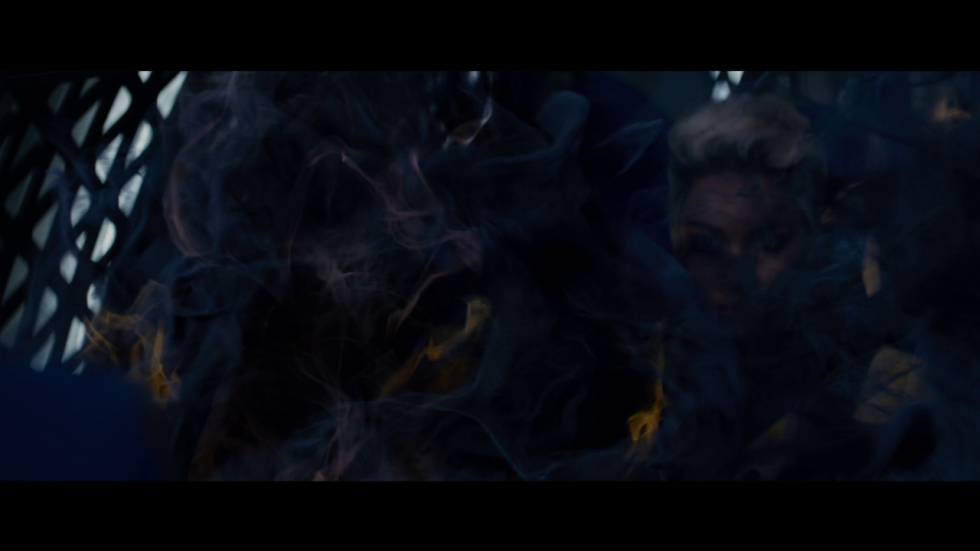
Arguably, the biggest shockwave in recent Marvel films and series wasn't a snap from a comics villain but a click of Disney CEO Bob Iger's pen. One by one, we've seen the reverberations of Disney's Fox acquisition from last year, mostly in the form of Netflix series wrapping up so that Disney can move full steam(boat Willie) ahead with its own films and streaming service. This week sees an arguably bigger conclusion: the end of the latest X-Men cinematic series.
Dark Phoenix sees the rug getting pulled from under the series' teen-reboot incarnation, which began life in 2011's X-Men: First Class and became an overwhelming mess in 2016's X-Men: Apocalypse. That last entry wrapped a bow on an apparent trilogy, but this week's one-more-time film is a bummer for a surprising reason. Dark Phoenix starts with a glimmer of hope that this central cast could go somewhere interesting if given one more shot. Much of the film plays out like an incredible, self-contained graphic novel, with legitimate surprises, compelling intra-X conflict, and a tighter focus on relationships that the last film lost sight of.
If you're the kind of series fan who can have your wind knocked out by a lousy ending and neatly wrapped bow, Dark Phoenix's best bits may not be good enough. But up until that annoying conclusion, the film does its best to redeem the half of X-Men that never had a Hugh Jackman or Sir Patrick Stewart to lean on—and the result is a pleasant surprise in a crowded superhero-film ecosystem.
X-Women to the rescue
-
No, this isn't a promo still from a bad virtual reality advertising campaign.
-
The X-Men gear up for an interstellar voyage.
-
"No, Beast, you do not get to control the radio."
-
Magneto (Michael Fassbender) is reaaaaally hoping that's not a familiar guy in a wheelchair behind him.
-
Spoiler: it is. Xavier is flanked by Cyclops (Tye Sheridan), Nightcrawler (Kodi Smit-McPhee), and Storm (Alexandra Shipp).
-
When Jean Grey does this thing with her hand in Dark Phoenix, expect weird stuff to follow.
-
Jessica Chastain's mysterious character has answers for Jean Grey.
Dark Phoenix's best content revolves around a trio of badass leads: Jean Grey (Sophie Turner, Game of Thrones), Mystique (Academy Award-winner Jennifer Lawrence), and a mysterious newcomer (Academy Award-winner Jessica Chastain). I can point to a single, cringe-worthy line of over-serious dialogue and delivery from each actor listed, which, for a lore-filled series like X-Men, is like shooting four-under-par on a single hole in a golf course.
Turner in particular steps up to the plate to juggle childhood trauma, coming-of-age anger, and endearing vulnerability, all while making sense of her complicated past. The film opens with Jean flashing back to the childhood moment when her life turned upside-down, at which point a certain Dr. Charles Xavier (James McAvoy, Glass) shows up with an interest in her apparent, mutant gifts.
The timeline then fast-forwards to the year 1992, when a core cast of seven familiar heroes (Jean Grey, Mystique, Cyclops, Storm, Nightcrawler, Beast, and Quicksilver) blasts off into space to save the day. This focused action sequence sees each hero trot out a superpower with some incredible VFX work applied, particularly the wisp-of-smoke warps that Nightcrawler leaves in his wake, while the inevitable "something's not right" twist plays out with logical rationale for every character involved.
Jean suffers the most intense consequences from this mission, but we also see showdowns among other characters, all clashing with their own interpretations of what life as an American mutant should mean. For some of the cast, the answer is to just be kids—and we get some welcome comic relief as a result, along with a few sequences that balance teenaged melodrama with superhero stakes. The result reminded me of my favorite parts in Spider-Man Homecoming, in which young characters have to contend with the usual coming-of-age trope of new powers versus old insecurities—though Dark Phoenix spreads that responsibility across more characters and, as a result, occasionally feels more like Dawson's butt-kicking Creek.
McAvoy also does well to portray Xavier's sometimes skewed priorities while still making his character likable and respectable—a fact that fuels a particularly interesting showdown between his character and Lawrence's. (Her reminder that "the women are always saving the men around here" may seem cheesy out of context, but in the heat of the film's moment, the line fuels an impressive showdown of X-Men leadership.)
It’s a bird (er, a phoenix), it’s a train

But the best relationship in Dark Phoenix is between Xavier and Jean, thanks to how their similar mind-reading powers collide at dramatic moments. That's all the more impressive when you consider that for some of their most intense conversations, the actors aren't staring each other down but instead having their conversations thrown against the wall of mind-reading CGI effects. The resulting glob of chopped-and-screwed memories, whizzing and blurring across a theater screen, could have been a dizzying, even obnoxious way to cut corners. Instead, Dark Phoenix's effects team delivers cohesive visual themes to sell these vignettes.
In even better visual news, the film's battle sequences pare down the usual open-sky, zillions-of-lasers paradigm that Marvel Cinematic Universe films have beaten us over the head with for the past five years or so. Focused camera angles stick with a particular point of impact long enough before cutting away to the next hero or conflict. Characters face off in clever ways, usually with each mutant's strength or weakness paired nicely with an ally or foe. And early events make clear that no fight's outcome is predictable, lending more weight and tension to each showdown.
An end-of-film train sequence does a particularly good job of selling the hierarchy of each mutant's strength. Weaker and stronger characters face off in ways that rationally make sense without diluting the tension of what's to come next—and this fact is carried forward by a solid variety of in-the-car and above-the-train camera angles, and major action moments to sell each.
Ultimately, none of this visually arresting stuff matters if we don't care about Jean, a superhero who spends much of the film peeling back onion layers of deception and tragedy. She and Mystique are the focal points, with every major male character failing the reverse version of the Bechdel Test by obsessing over them. The result is both a refreshing gimmick and a masterwork in execution. These two characters push the limits of what the X-Men organization should be, and they both suffer—and nobly carry—great heartbreak along the way, affording viewers the opportunity to attach our own coming-of-age metaphors. (I would argue this is executed well-enough to possibly surpass the best similar stuff in Captain Marvel.)
Without spoiling the whole thing, however, I'll just say that this specific praise all but crumbles once the film ends. Jean, Xavier, and a few other characters end Dark Phoenix with the kind of "nope, there's no sequel coming" tidiness that spits in the face of surviving and living through tragedy—a point that would have been wonderful to leave hanging for one more film in this X-Men universe. Alas. If this were a graphic novel, I'd rip out the final few pages and feel pretty good about having experienced the whole thing, and I urge anyone who likes this fork of the X-Men series to do the same, either at theaters or an eventual home-viewing experience in a few months.
https://arstechnica.com/gaming/2019/06/dark-phoenix-isnt-an-epic-x-men-conclusion-but-its-a-darned-good-teen-flick/
2019-06-07 10:45:00Z
Bagikan Berita Ini














0 Response to "Dark Phoenix isn't an epic X-Men conclusion—but it's a darned good teen flick - Ars Technica"
Post a Comment